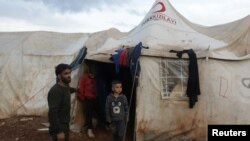A U.N. report finds nearly 10 years of warfare in Syria has been marked by what investigators describe as the most heinous violations of international humanitarian and human rights law, including genocide, with civilians bearing the brunt of past and ongoing atrocities.
An analysis of Syria’s decade-long war concludes no party has clean hands. The three-member Commission of Inquiry on Syria accuses all warring factions of committing horrific crimes for short-lived political gain or under the pretext of fighting terrorism.
It says the main victims of the international crimes are the Syrian people.
Commission Chair Paulo Pinheiro says children, women and men have paid the price of a brutal authoritarian government, which he says has unleashed overwhelming violence to quell dissent.
"Opportunistic foreign funding, arms and other support to the warring parties poured fuel on this fire that the world has been content to watch burn," Pinheiro said. "As the conflict drags on, the absence of decisive action by the community of states as a whole has nourished the culture of impunity that has developed inside Syria today.”
The report examines what it says are unscrupulous tactics used by all warring parties for territorial gain at the expense of the population. It documents incidents of aerial bombardments by the Syrian government and its Russian allies and the use of chemical weapons by President Bashar al-Assad’s forces on 38 occasions.
It describes indiscriminate mortar and rocket attacks and the use of improvised explosive devices against civilians by terrorist and other armed groups.
Commission member Karen Koning AbuZayd says the Syrian civilian population has been subject to modern day sieges over the last 10 years, leading to starvation and restrictions on humanitarian aid reaching people in dire need.
"There are basic human rights and humanitarian needs—food, water, health care, and education---that must be met regardless of which group controls which given territory…This continuing race to the bottom regarding respect of human rights of Syrians must stop," AbuZayd said.
The commission is calling for greater international efforts to end the conflict and put the country on a path toward peace and justice. But it warns durable peace in Syria will not be possible if victims’ demands for justice and accountability are not met.
Since the conflict erupted in March 2011, the United Nations estimates 400,000 people have been killed and more than 12 million people have been displaced within Syria and as refugees in neighboring countries and abroad.














